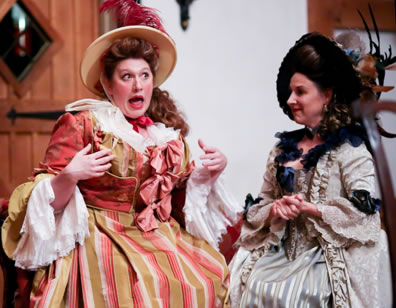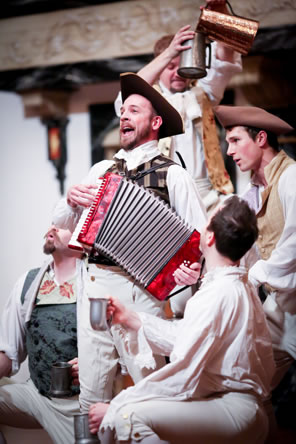The School for Scandal
Theater Exponential
By Richard Brinsley Sheridan
American Shakespeare Center, Blackfriars Playhouse, Staunton, Virginia
Sunday, April 9, 2017, C–5&6 (front middle stalls)
Actors Renaissance Season
Score one for the two teens sitting on the "gallants' stools." Those kids combine with the outstanding thespian talents of the professional players and the particular characteristics of the Blackfriars Playhouse in Staunton, Virginia, to create a singular theatrical moment. It comes during a presentation of the American Shakespeare Center's production of Richard Brinsley Sheridan's 1777 masterpiece The School for Scandal.

Lady Sneerwell (Ginna Hoben, right) watches Mrs. Candour (Allison Glenzer) transmit a scandalous rumor in the production of Sheridan's The School for Scandal at the Blackfriars Playhouse. Photo by Lindsey Walters, American Shakespeare Center.
The actors already are well on their way to achieving an audience hit with their take on Sheridan's witty, cynically observant play of manners. Doing so is all on them, too, as this production was the third in the five-play repertory of the American Shakespeare Center's (ASC) annual Actors' Renaissance Season. The purpose of “Ren Season” stagings is to replicate the production process that William Shakespeare's company used, just as the Blackfriars Playhouse that these actors occupy—the world's only replica of Shakespeare's indoor theater—replicates the staging conditions of Elizabethan and Jacobean theater: shared lighting for stage and audience, no electronic or digital effects, the audience in close proximity to the stage (even on the stage, sitting on gallants' stools along each side), and the actors directly addressing the audience as part of their play.
The Ren Season production process involves the troupe of 12 actors without a director mounting each play in abbreviated rehearsal times—generally in little more than a week—and adding them to the repertory until, two months into the season, all five plays are rotating through the schedule. The actors are responsible for the blocking, the props, and even the play's cut (member John Harrell served as script editor for The School for Scandal). They also devise their own costuming, though this year they have a “Costume Liaison” (Jenny McNee) whose primary purpose is to assist the actors in finding what they want in the theater's costume storage (without mussing up said costume storage). That's quite a luscious collection of costumes the ASC has, based on the gorgeous clothes the cast is wearing for this 18th century comedy.
In other words, “The fools are directing themselves,” says Snake, or rather René Thornton Jr., who plays Snake in the play and is in that character as he and Ginna Hoban, playing Lady Sneerwell, do their preshow address. This is the typical welcoming speech (either live or taped) that you get at most theaters these days, incorporating some self-promotion as well as reminders about no photography or audio recording and turning off cell phones and other devices that make noise. At the Blackfriars the speech also includes a quick explanation of the ASC and Ren Season staging conditions. The difference in this address compared to those for any other play, here or elsewhere, is that the actors not only are in character but giving the speech as if it were part of Sheridan's depiction of 1770s London, such as whispering the delicious rumor of actors “running amok without a director." At the point in the speech when they thank donors listed in the play program, Thornton's Snake points out that the list is “not a page, it's an insert,” speaking the word with an inflection and leering expression that leaves no doubt what scandalous act of social intercourse he's referring to. Finally, after a final admonition to "Silence your rumor makers," Lady Sneerwell and Snake take up their places for the play's start and begin speaking Sheridan's script.
I doubt that the actors are being anything other than clever—there's no great metaphorical purpose in presenting the preshow speech in this manner—but it does draw a straight line from smartphones to Sheridan's play about a society that obsessively indulges in gossip and scandal. One scene is devoted to the coterie of social gossips not only transmitting rumors but also dispensing insults about various people not in the room—and all purportedly friends and relations—as evidence for their wit. “There's no possibility of being witty without a little ill nature,” says Lady Sneerwell. “The malice of a good thing is the barb that makes it stick.” Today this coterie would be trolling on-line comment boards.
A scene later in the play has Crabtree (Josh Innerst) and his nephew, Sir Benjamin Backbite (Tim Sailer), outdoing each other in heightening the sensational facts of a duel fought between Sir Peter Teazle (David Anthony Lewis) and Joseph Surface (Grant Davis) over the latter's illicit rendezvous with the former's wife (Jessika Williams). The degree to which these two exaggerate their reports, and the heightening passion they use in trying to prove themselves the more prolific rumormonger is all the more comic in the fact that we, the audience, have seen both the rendezvous and the “duel”: the former a dud for Joseph as Lady Teazle counters his advances, the latter nothing more than Sir Peter Teazle casting a wry observation at the two-faced Surface before leaving the room. Remind you of Reddit or Twitter, perhaps?
I'm aligned with Sir Peter Teazle when he refers to "those utterers of forged tales, coiners of scandal, and clippers of reputation” as essentially criminal. “What, would you restrain the freedom of speech?” replies Lady Teazle, a notion of disingenuity 250 years ahead of time, the kind of argument I hear today defending the publication and circulation of unsubstantiated rumors, accusations, or impressions that makes me, a member of the Fourth Estate dedicated to both freedom of speech and verifiable accuracy, shudder.
But I digress, except to point out how this comedy—written in London at the same time as, across the ocean, the American colonies were agitating about independence—becomes so current in the hands of this Virginia-based company, something ASC tends to do with all of its productions. They do so not only by being experts with Early Modern English play scripts but also by fully owning their characters and the entirety of the play they are playing, even without any one body to guide them in the adventure. You see it in simple things like the secret salute Snake and Lady Sneerwell share. You see it in subtle things like the fact that, as the play opens, Lady Sneerwell is looking into a hand mirror on her vanity; when she puts it down and moves over to the settee, Snake takes up the mirror for self-inspection; he sets it down and the newly arrived Joseph Surface picks up the mirror to check himself out; every character who enters the scene thereafter picks up that mirror, except for the young Maria (Lauren Ballard), a common-sense girl who despises the society she's been thrust into.

Charles Surface (Chris Johnston, bottom right) and his wastrel friends sing a drinking song (complete with a choreographed mug-bumping dance) in Richard Brinsley Sheridan's The School for Scandal at the Blackfriars Playouse: Sir Harry Bumper (Tim Sailer) on accordianis joined by, clockwise from left, Josh Innerst as Careless, Benjamin Reed as 1st Gentleman, and Grant Davis as 2nd Gentleman. Photo by Lindsey Walters, American Shakespeare Center.
And you see it in the roles fleshed into four-plus-dimensional people. Mrs. Candour, for example, is a gossip who maintains that she deplores gossip and scandal proliferation but thrills at doing both; Allison Glenzer plays her with a syrupy sweet kindness that redoubles into a vibrating sugar fix as she anticipates even the potential that juicy gossip might be spilled at any second. Sailer as Backbite makes his first impression a lasting laugh the way he enters as a peacock, fixes his laser-focus aspect on Maria, whom he is pursuing with his uncle's goading, and struts his way to her side much to her disgust. Always feigning humility, Sailer's Backbite constantly competes to be the freshest, most poetical wit and archest slanderer in the room, thus, inevitably, appearing the most foolish of them all.
Such is the talent of a troupe like this that it cannot be confined by the boundaries set by the play itself. After all, this is one outing in a five-play repertory, which provides the context in which Harrell, playing Sir Oliver Surface, wealthy uncle to Joseph and Charles (Chris Johnston), earns one of the biggest laughs of the play, a triumphant applause line at that. Oliver, intending to test which of his nephews is more worthy of an inheritance, has disguised himself as a broker when he visits Charles, a profligate in need of raising money and offering to sell off his collection of family portraits. “Have you no bowels for your own kindred?” Harrell's Oliver says. “Od's life do you take me for Shylock in the play, that you would raise money of me on your own flesh and blood?” Charles replies, “Nay,” but we say “Yay,” for Harrell is playing Shylock in Shakespeare's The Merchant of Venice this very Ren Season.
So, at last, we've reached the moment where this review started. A few lines after the Shylock remark, a clanging bell announces the intermission. The bar cart comes onto the stage for patrons to partake of snacks and drinks that they can consume in the theater. The players reappear on the balcony above the stage to play music thematically apt for the production (and their musical abilities match their play-acting skills). Near the end of intermission, Glenzer strolls back on stage carrying a half-dozen picture frames. These she hands to people in the audience, including one teen-age boy sitting on one of the gallants' stools with his buddy by his side. Glenzer gives the recipients a simple instruction: on cue, hold the frame up to your face.
The play resumes in Charles Surface's gallery of family paintings. Given the dialogue between Charles and his disguised uncle referencing the portraits on the wall—“The merit of these is the inveterate likeness, all stiff and awkward as the originals, and like nothing in human nature beside!” says Charles; “Ah, we shall never see such figures of men again,” says Sir Oliver—the fact that the actors are referring to a gallery actually comprising real people in the audience already is funny enough. But when Charles turns to the first of the paintings he wants to sell, that of “my great uncle, Sir Richard Ravelin,” he turns to the boy on the gallants' stool: he is holding up the frame, but with both his and his buddy's face in the portrait. Johnston pauses just an instant before continuing. “Well, here's my two-headed great uncle, Sirs Richard Ravelin,” he says, and every singular reference to the great feats this uncle becomes plural, "they" instead of "he." Charles offers the painting for 10 pounds. “Heaven deliver me!” Harrell's Oliver says in aside. “His famous Uncles Richard for ten pounds!”
Credit the teen boys for so embracing this 250-year-old play that they want to be a part of it. Credit Johnston for smoothly embracing the moment. Credit Harrell for his subtly quick wit. But, what the famous Uncles Richard really represent is that theater can be exponentially more theatrical during the Ren Season at the Blackfriars Playhouse.
Eric Minton
April 26, 2017
Comment: e-mail [email protected]
Start a discussion in the Bardroom



 Find additional Shakespeareances
Find additional Shakespeareances